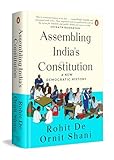Assembling India’s Constitution : A New Democratic History / by Rohit De and Ornit Shani
Publication details: New Delhi Allen Lane by Penguin Random House 2025Description: xx, 374 pages 24 cmISBN:- 9780670099658 (Hardback)
- 342.54029
| Item type | Current library | Shelving location | Call number | Materials specified | Status | Notes | Barcode | |
|---|---|---|---|---|---|---|---|---|
 BOOKs
BOOKs
|
National Law School | Circulation Counter | 342.54029 DE (Browse shelf(Opens below)) | HB | Available | Recommended by Prof. Dr. Arun K Thiruvengadam | 40491 |
Browsing National Law School shelves,Shelving location: Circulation Counter Close shelf browser (Hides shelf browser)

|

|

|

|

|

|

|
||
| 342.41 BAR The United Kingdom constitution : an introduction / | 342.5402 CHA Why the Constitution Matters : Selected Speeches / | 342.5402 CHO-4 The Oxford handbook of the Indian Constitution / | 342.54029 DE Assembling India’s Constitution : A New Democratic History / | 342.940858 PON - 1 Law of confidentiality / | 342.940858 PON - 2 Law of confidentiality / | 343.032 TAX-II-1 Foreign Exchange Management Manual with FEMA and FDI Ready Reckoner & FEMA Case Laws Digest | Set of 2 Volumes |
List of figures -
Acknowledgements -
Note on terms -
Introduction: A new history of India's constitution making:
1. Our constitution -
2. Making the constitution a public affair -
3. Competing constitutionalism: the princly states and the constitution -
4. The emerging states and the constitution -
5. The theatre of the assembly -
6. The horizons of India's constitutional imaginatio: Tribes and constitution making -
Conclusion: An open site of struggle -
Bibliography -
Index.
In this paradigm-shifting history, two leading historians of India re-examine the making of the Indian constitution from the perspective of the country’s people. In a departure from dominant approaches that foreground the framing of the text within the Constituent Assembly, Ornit Shani and Rohit De instead demonstrate how it was shaped by diverse publics across India and beyond. They reveal multiple, parallel constitution-making processes underway across the subcontinent, highlighting how individuals and groups transformed constitutionalism into a medium of struggle and a tool for transformation. De and Shani argue that the deep sense of ownership the public assumed over the constitution became pivotal to the formation, legitimacy and endurance of India’s democracy against arduous challenges and many odds. In highlighting the Indian case as a model for thinking through constitution making in plural societies, this is a vital contribution to constitutional and democratic history.
There are no comments on this title.
